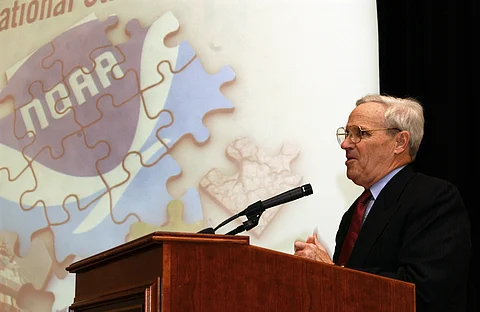

Hundreds of employees at the National Oceanic and Atmospheric Administration (NOAA) have been laid off as part of the Donald Trump administration’s broad effort to reduce the size of the United States’ federal government.
The move has drawn widespread condemnation from lawmakers, scientists and former NOAA officials, who warn of serious consequences for public safety, economic stability and national security.
The layoffs, which began on February 27, 2025, targeted probationary employees — those with less than two years of service or who had recently been promoted or transferred. The Commerce Department, which oversees NOAA, issued termination notices to affected employees, some of whom were given as little as two hours to leave their offices, according to sources who spoke to NPR on the condition of anonymity.
NOAA plays a critical role in monitoring and forecasting weather, including severe storms, hurricanes and climate trends. Its work is essential for industries such as agriculture, shipping and aviation and it provides life-saving information to the public during extreme weather events. In recent weeks, the agency’s National Weather Service (NWS) has issued urgent warnings for deadly flooding in Kentucky and severe winter storms across the country.
With the layoffs disproportionately affecting the NWS, experts are concerned about the potential degradation of NOAA’s forecasting abilities. A former NOAA administrator, Rick Spinrad, warned in The Guardian that losing experienced staff could have "dangerously risky" consequences, leaving Americans more vulnerable to natural disasters.
“This will cost American lives,” said Representative Zoe Lofgren, ranking member of the House Science, Space and Technology Committee, in a statement, reported British daily The Guardian.
The layoffs have also raised alarms about economic and national security risks. NOAA’s work supports over a third of the US gross domestic product (GDP), providing crucial data for industries that rely on accurate weather and climate information.
Senator Maria Cantwell, the ranking member of the Senate Commerce Committee, criticised the move, reported news website Axios. “This action is a direct hit to our economy, because NOAA's specialized workforce provides products and services that support more than a third of the nation’s GDP,” he stated.
Additionally, former NOAA official Timothy Gallaudet, a retired Navy oceanographer, told American broadcaster National Public Radio (NPR) that cutting NOAA’s workforce could negatively impact maritime safety, military operations and global trade.
Scientists and former NOAA leaders have denounced the layoffs as reckless and politically motivated. In an open letter, five former NOAA administrators cautioned that defunding and downsizing the agency would "severely impact our nation's economy" and reduce the effectiveness of critical weather forecasting and environmental monitoring.
Craig McLean, former director of NOAA research, condemned the firings as “callous, insulting, vengeful and offensive,” adding, “The nation will be compromised in safety, science and international standing by these reckless, blind acts,” The Guardian reported.
The Union of Concerned Scientists, a nonprofit organisation advocating for science-based policies, also condemned the move. “It seems either [Commerce Secretary] Lutnick willingly lied to Congress and the American people or that he has caved in record-breaking time to the destructive agenda of the Trump-Musk regime,” said Juan Declet-Barreto, a senior scientist at the organisation.
The layoffs at NOAA are part of a broader effort by the Trump administration to shrink the federal workforce, particularly in climate-related agencies. Other agencies facing cuts include the Environmental Protection Agency, the Department of Energy, the Department of Agriculture and the Department of the Interior. At the Interior Department, reductions have significantly affected the National Parks Service, Bureau of Land Management and US Fish and Wildlife Service.
According to Axios, federal agencies, including NOAA, are expected to face even deeper cuts in the coming months. The Department of Government Efficiency (DOGE), led by billionaire Elon Musk, has been instrumental in spearheading these reductions. Reports indicate that NOAA has been instructed to prepare for a budget reduction of up to one-third, which could further disrupt weather forecasting, climate data collection and research initiatives.
With hundreds of NOAA employees now out of work, concerns are mounting over the agency’s ability to maintain its critical services. A NOAA employee, speaking anonymously to The Guardian, described the firings as “cruel and thoughtless,” emphasising that the laid-off workers were “dedicated, hard-working civil servants who came to NOAA to help protect lives and keep our blue planet healthy.”
“It’s an absolute gutting of young talent,” another former NOAA employee told NPR, warning that the agency could take decades to recover from the loss of expertise.
Despite assurances from Commerce Secretary Howard Lutnick that NOAA would not be dismantled, the scale of the layoffs suggests otherwise. Lawmakers, scientists and the public now await the next steps from the administration, but the damage to NOAA’s workforce and its ability to carry out its mission may already be irreversible.